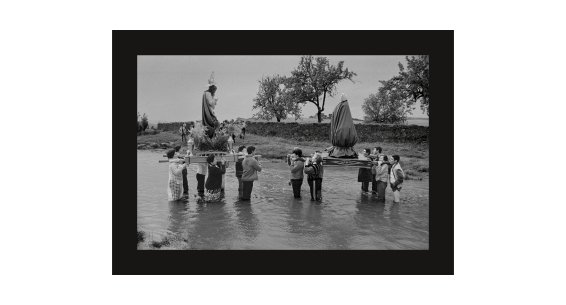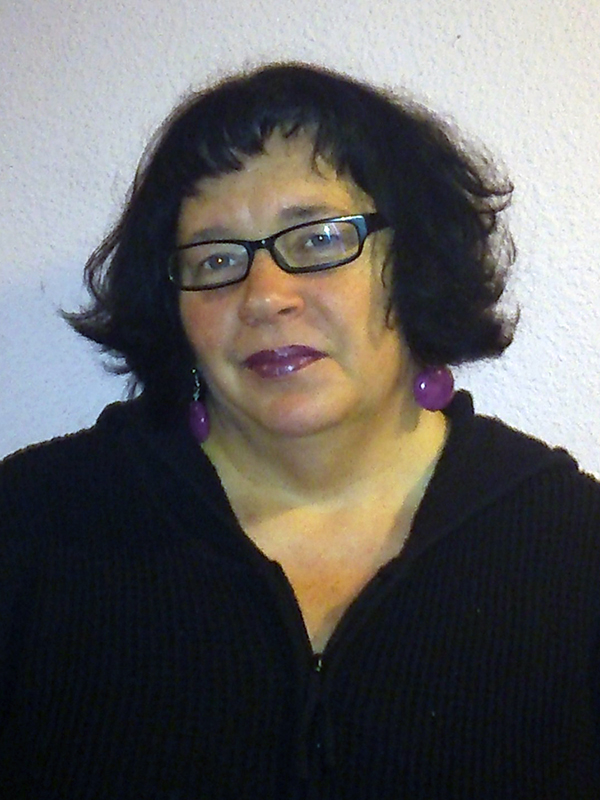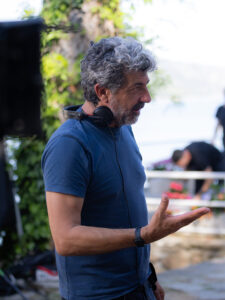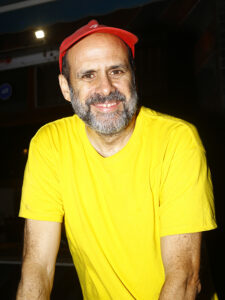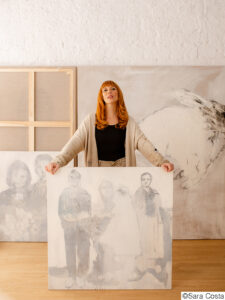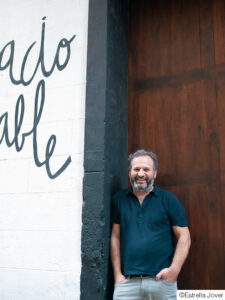Since the appearance of the invention of the cinematograph, we are surrounded by stories built with moving images. However, Do we know how to decipher those images? Do we understand what they “tell us”? How do these images and stories represent the world we live in?? What influence do they have or how do they shape our reality?? Is the reality they show us the reality in which we live or is it a particular vision (and interested) of the same? These are (some) of the questions that Áurea Ortiz tries to answer in her essay The art of inventing reality – when fiction blows up certainties, published by the Barlin publishing house books within its Landscape Collection. GERARDO LEON
You say in the book: “The arrival of the moving image changed our relationship with reality”. How do you imagine that first time we faced a moving image??
I imagine it must have been very shocking.. It is true that some optical devices had created that idea in the theater, but it wasn't the same. It wasn't that idea of the real world on a screen, even if it was seen in black and white. How do you cope?, suddenly, to see your daily life turned into a spectacle, in image, something like that. I insist, although many of the dioramas and all these previous optical games had already shown that idea of movement, It didn't even remotely resemble what the cinema offered, no matter how rudimentary the Lumière machine was. In the book I talk about the impression of [Maximum] Bitter, who saw that that was not reality and that it was the world of shadows and that it seemed terrifying to him. I want to think that there were many more people who realized that.. Not that it was terrifying, but that it was in black and white and there was no sound. Nevertheless, I think the effect had to be overwhelming.. It's not so much that they thought the train was coming at them. [The arrival of a train at La Ciotat, 1896], But I do believe they would throw back in amazement., in plan: “but this, what is?” And I also suppose that it was a very fair phenomenon, probably, to play with images, as had been done until then. I don't think anyone thought it would become an essential tool for so many things.
There is an idea that runs through the book and that raises this question in me.. Do images deceive us, they lie to us or confuse us?
(laughter) Well, I think that a little bit of everything. Man, deceive us yes they deceive us. Some more than others, evidently, but I think that, the moment you put a frame, that is no longer reality. and the photo, first, and then the cinema puts a frame. And the cinema frame is much more powerful and gives more illusion of reality than the photo because the photo remains still., there is no movement. It deceives us because it leaves a part of the world out and you see something isolated, that simply deceives us. Careful, It deceives us if you are waiting to see the reality. If you are faced with the fact that you are looking at an image and someone is highlighting something from that world to you, there is no possible deception. Are they lying to us? Well, some times more than others, but in general I think so. But it is in its essence, it's fiction. I say this several times in the book.: It's not that it's a lie, is that the truth of fiction is fiction. And it's true because the emotion is real, what you feel is completely real. The thing is that it is not the physical reality with which we tend to compare it. and confuse us, I think sometimes too. Sometimes we can be very aware that we are looking at an image and there is no possible confusion. I think that, somehow, we are all, in a deep way, aware of that. But it is true that, to the extent that you surrender to that story, it can confuse you, It can make you believe things that are not true.. I believe that the three things, Yeah.
Regarding this, There is a phrase from the book that I found intelligible and cryptic at the same time.. It's when you say that you have to "stop comparing fiction with reality to understand it.". “Fiction is an end in itself.”. How does fiction escape its relationship with reality to be that end in itself??
It's not that he escapes, it's something else different. Obviously, maintains relations with reality, I say this there. There was something in front of the camera, one person or several people, there was a landscape or a series of physical objects that already existed. Obviously, the world exists even if there is no camera in front of it. But the function of fiction, the audiovisual, It's not like reality. That is to say, you can make a movie with the intention of being very faithful to reality, that's a question. The other is that the final result will remain fiction, no matter how much you want to look like reality, and this is always like this. The function of fiction should not be to resemble physical reality, but to build a story with certain characteristics, with a point of view, of which the author may be more or less aware. I think the relationship is complex precisely because you start from real materials., but to build something that is in your head. Even if you are telling a very realistic story, even if you are telling one of those stories “based on real events”, this phrase made so heavy, it will remain a fiction. Fiction does not have to be justified by what it resembles reality. Fiction justifies itself, for creating your own rules, your own world, by creating their own relationships between things and their own relationship with reality.
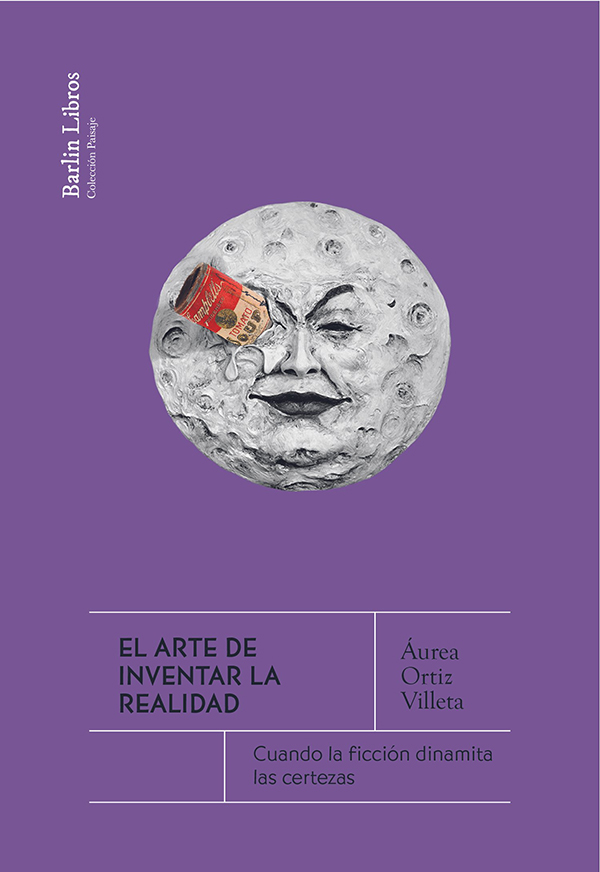 There is a relationship that marks the book and it is what separates what is real from what is plausible.. Why was it so important to make that difference??
There is a relationship that marks the book and it is what separates what is real from what is plausible.. Why was it so important to make that difference??
It seems essential to me when it comes to confronting or placing ourselves in front of a fiction.. A ver, it seems to me that, in general, almost everyone distinguishes it, but it is true that, sometimes, it's not very noticeable. Umberto Eco explains it with the idea that you can create a fantastic world, with its own rules, and that world may have nothing to do with reality. They are very different things and I think they tend to get confused when we judge a movie or a series.. There, the audiovisual story does confuse us a lot because we tend to think that what is on a screen is always real., even if they are spaceships circulating around Saturn. But not, it is only plausible. But it is also true if we see some workers in a factory.. And what is plausible has to do with the rules that each story creates.. You can make a very rebellious and very revolutionary worker fiction and make the workers dance and, if you do it right, everyone will enter that fiction. It will have some strange rules, but it will come in (as, in fact, there are movies that do it). They are very different things and I think it is very important to distinguish them today from what we tend to call real., I believe that partly because of this need to understand the world and, above all, for this plague of “based on true events”, to what they are telling us. And not, it is plausible. But that is an intrinsic condition of fiction. Also from a novel, What happens is that in the audiovisual field it is much more important to explain it because there is an image that corresponds to something that was real at a certain moment.: to an actor who was ahead, to a tree that was there or to a spaceship, even if it was a small model. It seems essential to me to understand the complicated relationship we have with fictions and the misunderstandings that it sometimes gives rise to.. Like when we believe that a historically set fiction puts you in front of history. No, you are facing a fiction built today on a fact from the past. There, For example, I think it is essential to distinguish between what is real and what is credible..
At another point in the text, you say “once reality has been reduced to image, "There is only story and speech left". Explain it to us.
Yeah, It's a bit like before. The moment you put a frame, you have made a choice about what you are going to tell. leave out some things, place something in the center, put something else in the corner, choose a certain color, etc. Then, you have to choose a point of view, an illumination, a camera instance, a film… We have a lot of decisions that make that image completely constructed, no matter how much it is an image of reality, or as much as it is a landscape that you see every day. Story and speech, Of course. I tell a story because you are building something that has a certain meaning. One thing follows another and there you are building something because we cannot prevent it from being that way. And then, speech because, obviously, obeys a specific point of view, yours. Y [that point of view] will be mediated by all the things you want, consequence of your beliefs, of the community in which you live and the world in which you live. But it's always speech. There is an author, there is an authorial instance that is creating that image and deciding, precisely that, what comes in and what doesn't come in.
United with that relationship between image and reality, The book implicitly carries a denunciation against a certain type of stories or speeches. There is a moment in What do you say you are angry?.
(laughter) A ver, It's not that I get angry, It's a certain laziness to always be telling the same stories.. Or in the fact that many stories have not been told or have not been told from certain points of view. There is a moment when I bring it up, For example, when I talk about western. From my anger from my teenage self when, in the western, I only see submissive women who wait for the vigilante to come to serve him dinner.. Or the girl in the living room. It's like I've seen this many times before.. Tell me something different, ¿no? Yes, that it is inevitable and that there is also a pleasure in seeing what you have always seen, That's why stories have always worked so well.. Like detective stories, For example, that are always the same. It's a fantastic pleasure. But that pleasure is one thing and the fact that “tell me things differently”. O “use new language”. If you are proposing that the world has changed a lot and that it is different, Maybe we need a new audiovisual language or a different way of telling. But, above all, I think that anger, which is broader, It comes from a certain way of receiving all those different speeches. It makes me very angry that the views that do not arise from the central and dominant view are always questioned.. It catches my attention when people get angry with certain movies because they are slow, or because “I just don't understand why they do this”, “It's just that the open ending thing is, I don't understand what the ending is.”. A lot of people get angry at these movies., they feel bad, and there my anger goes with that of “let those things be done”. That is to say, you already have a hundred thousand movies told exactly the same, with his approach, your knot, its outcome, with all its scale of plans well done and all its colors well placed. What is the problem that there are other ways of counting and that people dare to count in other ways?? Put the camera somewhere else, break the rules, etc. There I do have a certain anger, how difficult it is for people to attend to those speeches.
In that sense, one of the objectives of your analysis or criticism is Hollywood cinema as part of the construction of that dominant narrative.
It's just that Hollywood cinema has become, for many people, in the only possible cinema. Both the Hollywood cinema that geographically comes from there, like cinema that is assimilated to Hollywood. That is to say, You can make movies outside of Hollywood, but it's practically the same as what Hollywood does. It is done by copying the genres, the way to do, and that has become the dominant language. The thing is, if you think about it, It is still terrible that fictions constructed in a space of 10 km2 be the ones seen by billions of people around the world. I don't have any rant against Hollywood.. I am a fan of classic cinema, I grew up with that and there are many Hollywood movies that I like and I will never deny that., but I think it hasn't left air for other things. It doesn't have to do with them being better movies or anything like that., It has to do with a market occupation. It has nothing to do with the rules of beauty or aesthetics., but with pure and simple economic domination. Hollywood has been and continues to be a weapon of cultural domination of the United States. I think this must be said without undermining the fact that you can enjoy a Hollywood movie.. But I think that, as spectators, there we do have a certain responsibility. It's that: “oye, go see a movie from somewhere else”. Or a movie built with other rules. Really, that you even enjoy. But it seems that they are poorly received, what are niche movies, rare or elitist people. That bothers me a lot because I do believe that it is absolutely created from Hollywood. And I insist, without undermining all the strength that Hollywood has had and the wonders that it has offered us, but I think we have to be aware of what they are telling us, how they have told it and how they have dominated and continue to dominate in a way that prevents other things from being told.
You say in the book that classic cinema has a way of narrating that implies a concealment of the way in which those stories are constructed., and that this gives the viewer a wrong sense of order..
Bueno, I don't know if concealment is the word. A ver, classic cinema was created with very specific rules. But it's not like they were created before, I mean, It wasn't someone who said: “we are going to do it like this”. The beauty of all this (and the complex, also), and what makes it require many turns, is that that was created on the fly. A way of counting, well, functional, with its plane scale rules, of the connection, where the essential thing was space-time continuity, that is to say, that you perceived what was appearing on the screen as if you were in front of a window looking at the world, the window open to the world that Renaissance artists proposed with painting, but what, In fact, it has been the cinema. There a series of very diverse stories were built., because in Hollywood cinema there are many different stories, You can't be reductionist about this.. But there are also many that have never been counted.. Stories from other points of view, ways of seeing the world... If you pay attention to what Hollywood has told, It seems that only Americans fought in World War II.. Or it seems that the Vietnam War was absolutely decisive just because we have seen it in thousands of fictions, of all kinds, excellent and pitiful. Well, that has to do with the fact that there has been a system that has dominated and a certain way of counting in which other things have been hidden.. I mention it with the case of the series Watchmen (2019), that begins with the Tulsa massacre, which no one had any idea about [the case refers to the assault, in 1921, to the Greenwood neighborhood, in Tulsa, by armed white groups, in which they lost their lives around 300 african americans]. Suddenly, a mainstream series, (this is very striking, That's why I say that Hollywood cinema is very complex.), tells something we didn't know. It's a part of history that has never been told before.. Little Bighorn we have seen it from all points of view, or the Ok Corral massacre, a thousand of these things that the story tells from the point of view of the whites and the colonization that was done on the territory. Y, suddenly, a story where a series of white supremacists kill a lot of black people in a city, no one knew. Bueno, well, Why had Hollywood never told that?? Damn, Have they told the entire epic story of how the United States was created and it turns out that this has never been told before?? Well, that is an example in which I believe that there is a concealment., simply because a series of stories have taken precedence, facts, points of view, characters. Now those stories are being told and this is bothering, but this is another question.
But, For example, Hollywood also produced a movie like “Mississippi Burns.” (Mississippi Burning, Alan Parker, 1988). That would be Hollywood. And it could also be considered classic cinema.
Yeah, Of course. That's why I said before that the look at Hollywood has to be complex.. Hollywood allows the film to be made according to that white and hegemonic way of looking at the world, but it has also allowed other stories to be told. In the years 60 that begins to expand and, suddenly, The Indians are no longer so bad and people are starting to talk about pro-Indian causes., or there are films that begin to suggest that there may have been some massacre of whites on Indians.. Or you begin to see movies that say that the black population has suffered enormous discrimination; obviously, because the country changes and because new voices come in and certain stories can no longer be sustained because there comes a time when they are completely exhausted.. In that sense, I think the western has suffered a lot, but other stories too. I believe that Hollywood has this value that, from here, sometimes it catches our attention, and it is this ability to make films that denounce a lot. We have seen complaints of all kinds in Hollywood, from the Vietnam veteran who has gone crazy because he has been turned into a killing machine, which is a criticism of the system itself that does not take care of the people it orders to die and kill. Or you can tell that there are corrupt judges, even that a president of the United States is, things that maybe here you can't tell so easily, not even close, what parliamentary questions would cost. You can tell this, is completely normalized. But, Of course, depending on a certain way of doing it. But it is true that it is. I think Hollywood is capable of all that.. There is your greatness, to offer those stories. And now it's expanding a lot, Of course.
There is another element that you highlight and that is the difference between fiction and documentary.. Why was it so important for you to point out that difference??
Because if before I said that, with an audiovisual story, in general we let our guard down, with the documentary we lower it completely. It's as if we were saying, “Ah, this is a document of reality”. No, It is a movie built with certain rules, whatever their authors have used, but it's a movie. People don't consider documentaries, movies. Even when you tell them, “have you seen a movie”, they answer you: “no, “It was a documentary.”. Well, no. It's a movie. It's all movies. This is like real and credible, which I think are things that should be divided. In the book I give the example with literature. In literature we talk about essays and fiction, which I think is a differentiation that makes more sense, although sometimes it is difficult to distinguish it depending on which books. The essay always presupposes an author. With an essay you always understand that there is someone who is telling their point of view about whatever. in a documentary, no. In a documentary you lower your guard and suppose the world is so and that someone has put the camera in front to offer you. Bueno, has put the camera in front, But he has made a series of aesthetic decisions, narratives, of content of all kinds to organize it, And that is never aseptic. Never. Besides, This does not only affect the documentary as such, As a movie, affects informative language, to the way in which the news is offered, For example, To all that kind of thing. I give the example of the Hurdes (The Hurdes, Earth without bread, Luis Buñuel, 1933) that is very famous. Another example is the images of the Carrero Blanco attack. The prototypic image belongs to a fiction movie, of OGRO OPERATION(1979). At the time of the attack there was no camera in front, however, everyone has it fixed and does not pay attention to the fact that it is a reconstruction. nature documentaries, For example, They strictly follow the rules of action cinema. The crouching gazelle and the lion that watches over it. Well, maybe the lion was 20 km and they have taken it somewhere else, while the gazelle was filmed three days later, and then they have joined them in the montage. There is music! But how come there is music? Music is a rhetorical element, It is not an element of reality. and nothing happens, which is wonderful, let's enjoy, but let's understand that it is not exactly reality, which is a construction on something that happens in reality. Lions eat gazelles, but that lion in particular and that gazelle, no. There were no cameras at that time.. I think we have to reflect a lot on that because it has effects that I think go far beyond the animal documentary and have to do with the way in which we understand things that have happened and that they are offering us from a more informative or supposedly perspective. documentary.
There are many speeches that you criticize or judge, but among all of them, those that refer to family and romantic love stand out.. Why were you especially interested??
Because it seems to me that it is where it is easiest to see how an absolutely hegemonic discourse has been created.. In the case of romantic love, comes from 19th century literature, but I think that cinema has given it its definitive expression. It never ceases to amaze me that this works today and that in movies, both those that are released in cinemas and in television films, keep this Prince Charming idea working, of the better half, of marriage as the end of love. I think that the weight of how all the clichés of romantic love have been constructed in the cinema is weighing enormously on our behaviors.. I think it weighs less now because it has been subjected to constant criticism, not only in the cinema, But the entire social conception of love or couples has been questioned a lot in recent decades.. And naturally it is changing and, therefore, Its representation is also changing a lot and there are more and more fictions that call that into question., who laugh or who present it from other points of view, but I think the weight is still enormous. But it is also the representation of desire, of sex; there Hollywood has created an absolute paradigm that is not real. It is plausible (laughter), but it is not real and I think that it does have weight because it has weight in our daily behavior, in our expectations. And the family model is the same.. Obviously, The patriarchal family model has been dominant for centuries, outside the cinema. But cinema has given it an iconographic expression. They seem to me to be two of the territories where the enormous weight of cinema or audiovisual fiction is best seen., in general, In our lives.
In addition to the family, You talk about friendship. The speech of a series like Friends It's really so pernicious? I think you're going to win many enemies, in this case.
(laughter) But not, I don't think the speech of Friends. A ver, I think it's not very real either. Me Friends It seems to me a very funny series, I think it is a great series that has a huge importance culturally, I have no doubt. And, although some things have been questioned now, I think that, If you stand at the time, it's very nice. Our Friends, I like. But it is true that this group of friends is unfeasible in real life. That is to say, There are many differences between them, Modes of being that they are practically incompatible. You can love Joey a lot, But maybe a friend like Joey is unbearable. Or the same thing happens in The Big bang theory. We all love Sheldon Cooper, But I doubt we could hold Sheldon Cooper as a friend, With the demands that this friendship supposes. I do not consider it, It is an ideal. There is the aspirational working. I want a group of friends like this. Who does not want? Apart from that all are white, handsome and such, which is another issue that can also be raised. But, even buying the standard, Of course I want a group like this, so happy, that everyone enters their homes without having a key, that are for hard and mature, That any discussion lasts anything and ends up having coffee at the Central Perk. Not bad, What to have ideals is beautiful, But I want us to be aware that it is an ideal. I mean that.
At the end of the book you propose that the solution to our relationship with the images goes through education. But, at the same time, You also affirm that "all governments try to control audiovisual production". Who educates us, so, In the image?
¡Ah! A ver, is that now almost nobody educates us in the image. In some educational centers something is being given, but not in a systematic way, taking into account the immense importance they have in our lives. I think it is essential to form in image as forms in language or literature or poetry. It seems great to me, I don't want one thing to be replaced by another, But it is incredible that they do not talk about assembly or the fact that the images suffer modifications, What is a frame, Of all this kind of thing we are talking about. Is that today the image is the tool that everyone uses. And not only as spectators, but we also build them, besides. Today the images surround us everywhere and largely create our worldview through what we have seen in images, among other things because we have no direct experience of all the things we see in the images. We have not been in all the places we see there, We have not seen those realities. Who forms? Of course, the curricula that must be built, evidently, But this is worth any other field. Who forms in whatever? Who controls education? This happens a bit like Hollywood. It is complex. Obviously, Governments approve curricula, But they are built, I understand, collectively, And then there are many elements that mediate until it reaches the student. Obviously, If it is a fascist dictatorship, will try to get out of everything and prevent things from seeing. And if you are not, They will be more diverse, That is so. But education seems fundamental to me. It seems fundamental to me that the spectator ask the question of how this image is constituted, How are there two planes. But if nobody knows what a plane is, that there is assembly, That question will hardly be asked. And it seems essential to me.
If for Plato, the theater (And I think it is worth the cinema, For fiction) It was a danger because it turned on the passions and that clouded the understanding, For Aristotle it was a way of having experiences that enriched us. If the images manipulate us, Aristotle or Plato?
Aristotle, always. To me the images do not seem a danger, They seem to me something we need. I say it in the book: We have been doing images for fifty thousand years (And more likely; It simply has not yet discovered). We need them, It is obvious. I say that when the hominid that or the hominid or whatever it was up and painted something, I probably had almost nothing solved and the same was dying in the next hunting incursion, But I had to tell it and make an image. In that sense, I think it's a drive. It is one of those structural things that are part of us, Tell stories through orality and paint. I think so, Always in favor of images, please.

